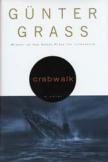Dysfunktionelles Deutschland
George Santayana should have warned us: those who can remember the past, but do so obsessively, are just as condemned to repeat it as those who forget. The 1999 Nobel laureate Günter Grass has been prophetically attacking and mourning the horrors of 20th-century German history since the publication of his first and still most popular work, The Tin Drum (1959). In this arresting docu-novel, ably translated by Krishna Winston, he delves into a dreadful episode from World War II, the sinking of the Wilhelm Gustloff, and the weird power that memories of it have to mangle the lives of Germans more than half a century later.
Never heard of the Wilhelm Gustloff? Named after a Nazi Landesgruppenleiter (national party leader) who was shot to death in Davos, Switzerland, in February 1936 by a Jew named David Frankfurter (who surrendered to the police immediately afterward), the ship was launched in May 1937. The pride of the “Strength Through Joy” (workers’ vacation) fleet, the W. G. was refitted after the war broke out for service as a hospital ship and then as a floating barracks. On Jan. 30, 1945, the 12th anniversary of Hitler’s accession and the 50th birthday of the “martyred” Gustloff, the ship was sunk at night in the Baltic Sea by a Soviet sub. It was frightfully overcrowded with 9,000 to 10,000 passengers, mostly refugees, including 4,000 children. Fewer than 100 persons were rescued: it was the worst maritime disaster in history (with six times as many fatalities as the Titanic).
The narrator of Crabwalk is a journalistic hack named Paul Pokriefke, who was born that very night, either aboard the Gustloff itself or on the torpedo boat Löwe, which picked up some of the survivors. Pokriefke’s mother, Tulla, for whom he expresses nothing but contempt, first appears as an unmarried 17-year-old girl who neither knows nor cares who the father of her child might be. After the war she moves to Schwerin (the birthplace of Wilhelm Gustloff), where she becomes a master carpenter and a “deserving activist” in the soulless wasteland of East Germany. Her fierce loyalty to the German Democratic Republic notwithstanding, Tulla focuses her mental energy on reliving the nightmare of the Gustloff, which she blames entirely on the Soviets.
Meanwhile, her son, Paul, moves to the West and around 1980 impregnates his girlfriend Gabi (who casually fails to inform him that she’s gone off the pill), gets married and then quickly divorced. Gabi and son Konrad head to Berlin (Paul, unsurprisingly, does not bother to keep in touch), where, after the fall of the Berlin Wall, a strange, generation-skipping alliance springs up between Tulla and Konrad.
What could a card-carrying socialist grandmother have in common with her extremely bright neo-Nazi grandson? Well, among other things, gross political myopia and the cult of Wilhelm Gustloff. Making ingenious use of the Apple computer Tulla has given him, Konrad becomes an expert on, and champion of, Gustloff, whose assassination he hopes to avenge.
What we have in the end is three generations of Germans who are at best feckless and confused and at worst dangerous maniacs. Together they help to perpetuate what Grass calls “the history we Germans have repeatedly mucked up...a clogged toilet. We flush and flush, but the sh__ keeps rising.” Though they sum it up, those bitter sentiments are not the last word. Grass’s actual parting shot is briefer and bleaker: “It doesn’t end. Never will it end.”
Like the crab in his title, Grass scuttles sideways from one point to another in the past, most notably tracing the jagged, intertwined trajectories of the lives of Wilhelm Gustloff, David Frankfurter (who made it to Israel and died at 82), Tulla Pokriefke and Aleksandr Marinesko, the lecherous, alcoholic, insubordinate commander of the Soviet U-boat. This is very well done, with the twisted wealth of ironic detail found in all grand tragedies (e.g., the cruiser Admiral Hipper, which tried to rescue the survivors, sliced some of them to pieces with its propeller; and Marinesko had no idea who was on board the W. G. (There were, in fact, a lot of military personnel, including 375 girls from the “naval auxiliary.”) If nothing else, Grass has powerfully reminded us of a forgotten catastrophe.
But there are problems. All the Pokriefkes are opaque and two-dimensional. The reader has a hard time caring about them one way or another. The narrator seems to have absolutely no life at all (apart from the mildly amusing touch that his historical research—i.e., this book—has been commissioned by an unnamed character who sounds a lot like Günter Grass). Konrad Pokriekfe is preternaturally articulate for a teenager. And the sensational shooting that marks the climax of Crabwalk strains credulity beyond the breaking point.
Still, when have German writers ever been known for shapely prose structures? Grass is basically on a tear against the culture he can neither live with nor live without. And on an inescapable guilt trip (born in 1927, Grass was a member of the Hitlerjugend before he was drafted into the Wehrmacht). It is no accident that the impossible, farcical Tulla was born in the suburbs of Danzig-Gdansk, where Grass himself first saw the light of day. He is a decidedly retro guy (with his corny old beret and bushy Saddam Hussein moustache) and a reminder, if a reminder be needed, for the 21st century that in severely dysfunctional Deutschland there were (and are) some good Germans.
Despite its ungainliness, Crabwalk takes readers on a journey that should not be missed.
This article also appeared in print, under the headline “Dysfunktionelles Deutschland,” in the February 23, 2004, issue.








